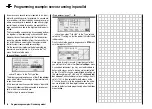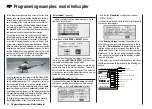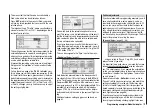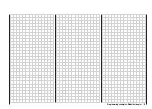
103
Programming examples: F3A model
4. Rolling when ailerons and fl aps are extended
If you fl y the landing approach with both ailerons de-
fl ected up, the model may show a tendency to roll
slightly due to minor variations in aileron servo travel
(or constructional inaccuracies); i.e. the model may
turn to either side by itself. Once again, this tenden-
cy can easily be corrected using a mixer to vary the
compensation according to the position of the aile-
rons / landing fl aps.
MIX
„c1
ar“
You must provide a means of switching the mixer on
and off using the switch which controls the aileron /
landing fl ap function (see previous page). The mixer
therefore only has any effect when the aileron / lan-
ding fl ap function is activated. The optimum value has
to be found by test-fl ying.
Summary
The settings described on this page are intended pri-
marily for the expert fl yer. Please bear in mind that re-
fi ning the fl ying characteristics of a model to this extent
involves tremendous effort, time, sensitivity and exper-
tise. Some experts continue the programming procedu-
re even when they are fl ying. It is not advisable to try this
if you are just a moderately advanced pilot making your
fi rst attempt with an F3A aerobatic model. You would
be well advised to request help from an experienced pi-
lot, and carry out the fi ne-tuning adjustments mentio-
ned here one by one, with the expert at your side, un-
til your model exhibits the neutral fl ying characteristics
you desire.
Summary of Contents for MX-16S
Page 1: ...1...
Page 17: ...17...
Page 31: ...31 Fixed wing models Installation and connections...
Page 35: ...35 Program description Reserving a new memory...
Page 47: ...47 Base settings Model helicopter...
Page 83: ...83 Fail safe...
Page 89: ...89 Programming examples Fixed wing model...
Page 109: ...109 Programming examples Model helicopter...
Page 112: ...112 112...
Page 116: ...116...














































